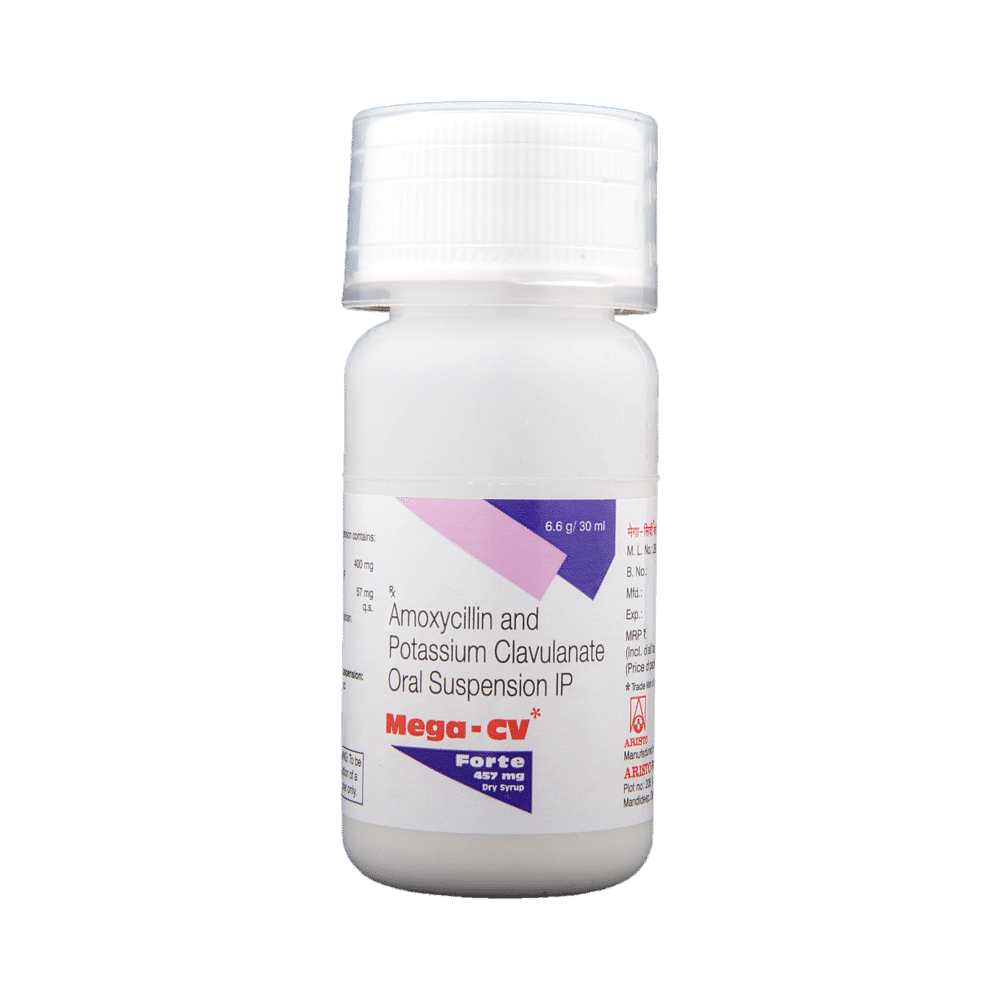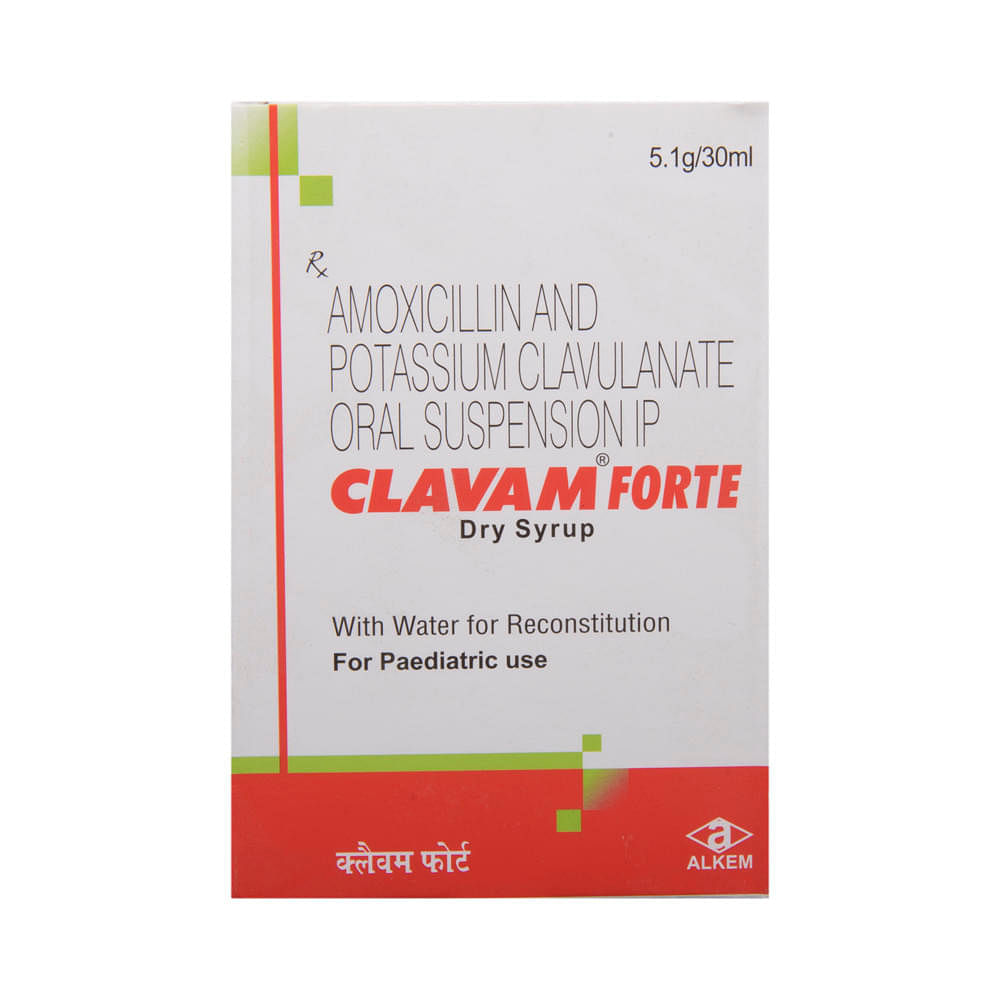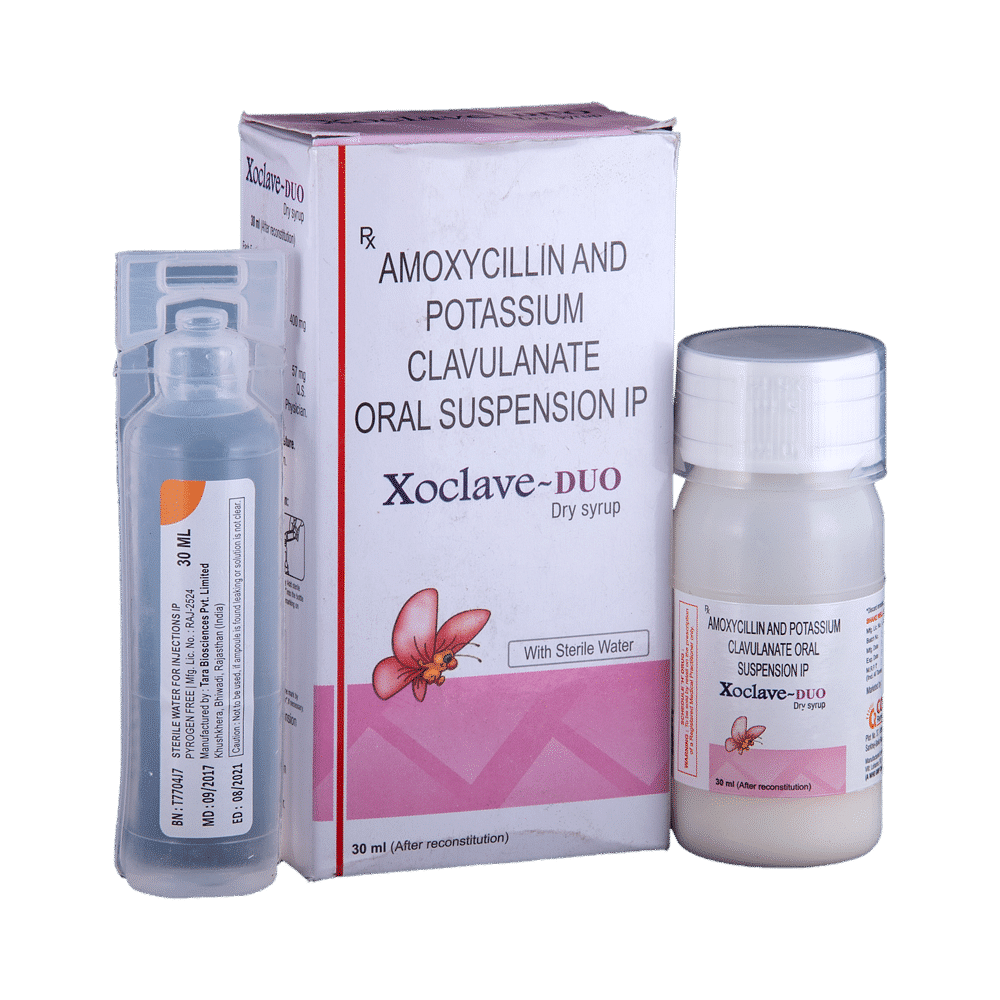
Cimoxy Clav Duo Dry Syrup
Manufacturer
Otik Biotec
Salt Composition
Amoxycillin (400mg/5ml) + Clavulanic Acid (57mg/5ml)
Key Information
Short Description
Cimoxy Clav Duo Dry Syrup is an antibiotic medicine that helps treat bacterial infections of the ear, nose, throat, chest, lungs, teeth, skin, and urinary tract.
Dosage Form
Dry Syrup
Introduction
Cimoxy Clav Duo Dry Syrup is an antibiotic medicine that helps treat bacterial infections of the ear, nose, throat, chest, lungs, teeth, skin, and urinary tract. It is capable of killing bacteria that have become resistant to other therapies and thus also helps treat tuberculosis that is resistant to other treatments.
Directions for Use
Your child must complete the entire course of antibiotics. Stopping too soon may cause the bacteria to multiply again or cause another infection.
How it works
Cimoxy Clav Duo Dry Syrup is an antibiotic. It has two active agents amoxycillin and clavulanic acid. Amoxycillin works by preventing the formation of the bacterial protective covering (cell wall) essential for the survival of the bacteria. Whereas clavulanic acid serves a special purpose of inhibiting an enzyme (beta-lactamase) that is produced by resistant bacteria. This makes the combination of amoxycillin and clavulanic acid an effective line of treatment for many types of infections.
Quick Tips
Your child must complete the entire course of antibiotics. Stopping too soon may cause the bacteria to multiply again or cause another infection. Your child may have a bitter taste in the mouth after the intake of Cimoxy Clav Duo Dry Syrup. Eating citrus fruit or sipping plenty of water or fruit juice may help. Encourage your child to drink plenty of water in case diarrhea develops as a side effect. Never give Cimoxy Clav Duo Dry Syrup until and unless prescribed by the doctor. Do not give Cimoxy Clav Duo Dry Syrup to treat common cold and flu-like symptoms caused by viruses. Never save medicine for future illnesses. Check ‘expiry’ before giving Cimoxy Clav Duo Dry Syrup to your child. Immediately discard all the expired medicines. Stop Cimoxy Clav Duo Dry Syrup immediately if your child develops an itchy rash, facial swelling, or breathing difficulty. Report to the doctor without any delay.
Related Medicines

Mega-CV Forte 457mg Oral Suspension

Clavam Forte Dry Syrup

Agunex CV DS Dry Syrup

Penclav Dds Dry Syrup

Mpx-CV Forte Dry Syrup

Maxtio CV Forte Dry Syrup

Ibiclav Dry Syrup

Xoclave -Duo Dry Syrup

Polclav Dry Syrup

Truclave DS Dry Syrup
Frequently asked questions
Can other medicines be taken simultaneously with Cimoxy Clav Duo Dry Syrup?
Cimoxy Clav Duo Dry Syrup may interact with other medications or substances. It is crucial to inform your child's doctor about all the medications they are taking before starting this medication. Additionally, consult a healthcare professional for guidance regarding administering any medicine to your child.
Can I get my child vaccinated while on treatment with Cimoxy Clav Duo Dry Syrup?
Antibiotics do not generally interfere with the ingredients in vaccines or cause adverse reactions. However, children should not receive vaccinations until they recover fully from the illness. After your child recovers from their illness, you can discuss vaccinating them with their doctor.
Which laboratory tests may my child undergo while on long-term Cimoxy Clav Duo Dry Syrup treatment?
For extended therapy, a regular check of kidney and liver function is recommended to monitor your child's condition.
Can I give more than the recommended dose of Cimoxy Clav Duo Dry Syrup to my child?
Giving a higher dose than recommended may increase side effects. If you notice any worsening symptoms, contact your child's doctor for re-evaluation.
Can I stop giving Cimoxy Clav Duo Dry Syrup when the symptoms are relieved?
No, do not stop giving this medication unless your child completes the full course of treatment. Symptoms may improve before the infection is fully cleared. Therefore, continue administering the medicine according to the prescribed schedule.
Can Cimoxy Clav Duo Dry Syrup cause diarrhea in my child?
Yes, Cimoxy Clav Duo Dry Syrup can cause diarrhea as a side effect. It is an antibiotic that eliminates harmful bacteria, and it may also disrupt the balance of beneficial bacteria in your child's gut, leading to diarrhea. Encourage drinking fluids if your child experiences diarrhea. If it persists or you notice signs of dehydration like infrequent urination with dark-colored and strong-smelling urine, consult a doctor before administering any additional medication.
Do all viral common colds result in secondary bacterial infection?
Most viral infections do not directly cause secondary bacterial infections. Antibiotics should only be used if your child's doctor recommends them, especially when a secondary bacterial infection is suspected.
The mucus coming out of my child’s nose is yellow-green. Is this a sign of a bacterial infection?
Yellow or green mucus in the nose does not necessarily indicate the need for antibiotics. During a common cold, it's normal for mucus to thicken and change from clear to yellow or green. Symptoms typically last 7-10 days.
Are there any signs that my child needs immediate medical attention?
It is crucial to seek immediate medical attention if your child experiences symptoms such as severe allergic reactions (difficulty breathing, skin rashes), gastrointestinal infections (diarrhea), or liver damage (weakness, paleness, vomiting). These serious side effects require expert evaluation.


